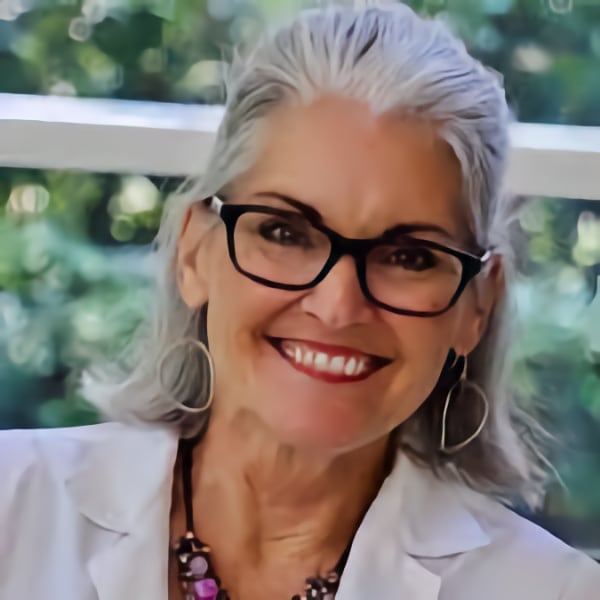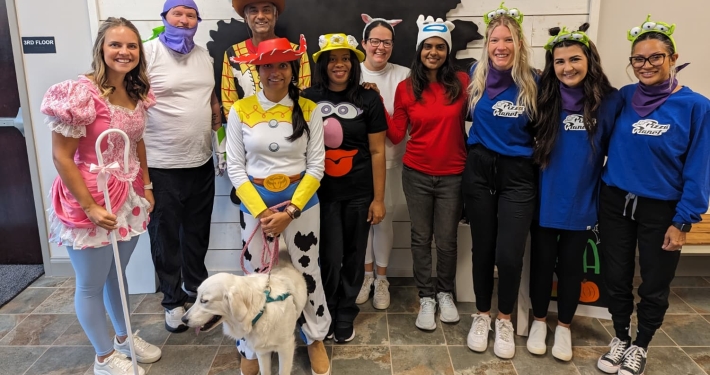The Changing Face of Adolescent Health: Caring for Girls in Post-Roe America
The overturning of Roe vs. Wade presents unique challenges for adolescents. Dr. Trish Hutchison and Dr. Melisa Holmes, founders of Girlology, speak to how patients are being impacted, and what pediatricians can do to help.
“Regardless of anyone’s stance on abortion, there has never been a more important time for young people to understand their reproductive health.”Dr. Melisa Holmes, co-founder of Girlology
The Overturning of Roe vs. Wade
“Regardless of anyone’s stance on abortion, there has never been a more important time for young people to understand their reproductive health.” So says Dr. Melisa Holmes, MD, a pediatric and adolescent OBGYN in Greenville, South Carolina.
On June 24, 2022, the U.S. Supreme Court overturned Roe v. Wade, the 1973 decision legalizing abortion at the federal level. With this decision, the Court relegated decision-making on abortion rights to the states, which led to immediate restrictions and roll-backs in nearly half the country. Dr. Holmes’s home state of South Carolina already held strong abortion restrictions, but the overturning of Roe threatened to intensify them, as well as impact the reproductive care providers are able to offer. “The laws could change any day. It’s nerve-wracking,” says Dr. Trish Hutchison, MD, who provides care to students at the College of Charleston. “So what I do in my practice is, I take more time with my patients. With the landscape these days we have to be really careful.”
Drs. Holmes and Hutchison are co-founders of Girlology, an online platform with national reach that helps parents and girls learn about their bodies and reproductive health. Girlology emerged from a grassroots need that Drs. Holmes and Hutchison saw in their community, one for comprehensive and unapologetic education for girls and their families about their changing bodies. As educators, moms, and health care providers, Holmes and Hutchison shed light on how the overturning of Roe could impact their state, their patients, and young women across the country—and how pediatricians can step in to support patients as they navigate a changing world.
South Carolina’s Abortion Ban Timeline
Dr. Melisa Holmes has more than 20 years experience as an OBGYN with expertise in pediatric and adolescent gynecology, and as an educator for medical students, residents and colleagues. Alongside her work as co-founder and CEO of Girlology, she has served on the American College of Obstetricians and Gynecologists’ Committee on Adolescent Health Care and worked with the National Campaign to Prevent Teen Pregnancy. Dr. Holmes offers diverse perspectives on the overturning of Roe, but her role as a patient advocate and educator is the throughline that guides her thinking.
“South Carolina has always been on the front lines with regards to abortion restrictions,” Dr. Holmes explains. “We require ultrasounds; we have a 24-hour mandatory waiting period; we have parental consent laws; and we’ve always had an abortion ban after 20 weeks.” In addition to these mandates, patients in South Carolina are forced to wait 24 hours following counseling to obtain an abortion, and State Medicaid coverage of abortion care is banned except in limited circumstances, among other restrictions. All of these mandates were in place prior to the overturning of Roe.
However, in summer 2022 the South Carolina House passed a measure banning almost all abortions. “When Roe was overturned, we had a transient time where we basically had a heartbeat ban,” Dr. Holmes says. “But I think other states that preceded us showed us the real-world consequences of those bans.” She continues, “Because of what was happening nationally, we had some legislators who recognized the insanity and said, ‘I can’t support this. Because of my daughters, or the conversations I’m having with OBGYNs who are struggling.’ So South Carolina overturned the ban.”
South Carolina lawmakers were no doubt watching the wave of pro-choice activity that sprung up in states with post-Roe trigger laws. Prior to the November 2022 midterms, states like Kansas served as emblems of abortion rights wins, with nearly 60% of voters choosing to preserve abortion as a right in the Kansas state constitution. After Kansas’s “Value Them Both” amendment was defeated—a move aiming to ban abortion in the state constitution—other conservative states took note.
“There were really difficult conversations happening. There was a lot of anger, because our hands were tied. We weren’t allowed to practice the medicine we were trained to practice. We weren’t able to keep the oath that we took.”Dr. Melisa Holmes
Heartbeat bills prohibit abortion once a fetal heartbeat can be detected, as early as six weeks into pregnancy. Many women don’t yet know they are pregnant within this timeframe. Heartbeat bills often include the concession that abortion is legal when required to “save the life of the mother,” but there are myriad maternal health complications that precede a threat to life, and deciding when that threat is imminent can be difficult. Dr. Holmes reflects on the window of time where abortions were essentially banned outright in her state. “There was a lot of chaos in the medical world here, especially for maternal-fetal medicine specialists, because they were taking care of the women who had ruptured their membranes early, or had severe preeclampsia, or were really young with potential complications,” she says.
Dr. Holmes continues, “Teenagers are at much higher risk for complications in pregnancy than adult women. So providers were having daily conversations with legal counsel asking questions like, ‘When is she sick enough? Who gets to decide when she’s close enough to death?’” This climate created stress for many pediatricians and OBGYNs. “There were really difficult conversations happening,” Dr. Holmes says. “There was a lot of anger, because our hands were tied. We weren’t allowed to practice the medicine we were trained to practice. We weren’t able to keep the oath that we took.”
The South Carolina Senate rejected the total abortion ban in September 2022, but debate could resume in the next legislative session. “We’re all on high alert for when that happens,” says Dr. Hutchison. “That’s why I talk about birth control to every young person that comes through college health.”
Post-Roe Changes in Adolescent Care
A 2022 article in Ms. Magazine conjectures that “over the next year, at least 7,000 U.S. teenagers will likely be forced into parenthood because they were not able to obtain a desired legal abortion following the overturning of Roe v. Wade.” According to the CDC, 75% of teenage pregnancies are unintended. Unintended pregnancy presents greater health and socioeconomic risks for teenagers as opposed to adults. And yet, teens are expected to be disproportionately impacted by abortion bans.
“Abortion has always been a sticky situation for teens,” says Dr. Holmes. “But now, with Roe being overturned, it will be even more challenging for them to get care.” Dr. Holmes explains that with 20 week bans, adolescents are more likely to miss their window where they could access safe and legal abortions. “Adolescents notoriously show up later for their first prenatal visit than adults do,” Holmes says. “They notoriously figure out they’re pregnant later than most people who are trying to conceive. They’re not looking out for this.”
Further, if adolescents miss their window in a state with a 20 week ban, it’s harder for them to travel for care. Geographically, South Carolina is bordered by states with similarly restrictive or more restrictive abortion laws. A South Carolinian unable to access care in their state would likely need to travel to Virginia, Maryland, or Illinois for an abortion, prohibitively long distances for people already facing barriers due to race, income, gender identity, or age. This kind of geographical isolation holds true in many states with restrictive abortion laws, such as Louisiana and Mississippi.
Dr. Trish Hutchison provides insight based on her 30 years of clinical experience that has focused on adolescents. . Alongside her work with Girlology, Dr. Hutchison continues to see patients as a Campus Physician at the Student Health Center at the College of Charleston, giving her a unique perspective on the needs of college-aged women. She is an expert on adolescent development, teen sexuality, and parenting.
“Think about a teenager,” says Dr. Hutchison. “This is what’s really sad. A teenager who thinks they’re pregnant is probably freaked out, and now they have to navigate the healthcare system and potentially plan interstate travel. It involves them picking up the phone or going online, trying to make an appointment, navigating medical offices in other states, and then they have to find a means of transport, and they have to have funds.” She continues, “All of this causes a delay in their care.”
“Carrying an unwanted pregnancy to term for a teen has lifelong complications,” Dr. Hutchison explains. “It’s not only health concerns for mom during a teenage pregnancy, but also for the infant. And then there’s the added mental health challenges of them feeling stuck, trapped or hopeless if they don’t have the choice to terminate a pregnancy.” All of these factors have led Drs. Holmes and Hutchison to practice with an ethos of deeply prioritizing patient education.
Beyond medical implications, the overturning of Roe has emotional and psychological consequences for teens. “Puberty and adolescence is a time when kids are already full of anxiety,” says Dr. Holmes. “And the biggest source of that anxiety starts with their changing bodies. They’re brain is also going through a lot of changes. So when you add something like this on top of what is already a stressful time of life, it’s bound to have impact.”
“Everyone, including teenagers, deserves the right to confidential medical care that best supports their own needs, and is informed by physician expertise.”Dr. Trish Hutchison
The State of Sexual Education in the U.S.
“Teens are a vulnerable group,” says Dr. Hutchison. “They’re not well-educated on their bodies. They don’t always know they’re pregnant; they don’t know when they should be alarmed; they don’t know the importance of tracking their cycle. And they also don’t always have safe sex education.”
Numerous studies speak to the fact that young people are woefully uneducated about their bodies and reproductive health. Dr. Hutchison references a 2020 study that found that 25% of pediatricians do not provide anticipatory guidance to premenarchal patients; 33% fail to discuss menstruation with menstruating patients; and 28% do not ask patients the date of their last period. Male pediatricians were significantly less likely to evaluate patients’ menstrual cycles and provide patient education, and had significantly lower self-rated and measured knowledge of female sexual health. The majority of the pediatricians surveyed were “not at all” or only “slightly” familiar with the AAP guidelines on anticipatory guidance surrounding menstruation.
Dr. Hutchison adds that teens aren’t always made aware of confidentiality in their visits with pediatricians, so if sexuality is discussed, patients may not feel comfortable asking questions. “Everyone, including teenagers, deserves the right to confidential medical care that best supports their own needs, and is informed by physician expertise,” Dr. Hutchison asserts.
Both Dr. Hutchison and Holmes reference a 2014 study that found that the average amount of time pediatricians spend discussing sexuality with their adolescent patients is just 36 seconds per patient. This metric comes from visits where sexuality was discussed; in 35% of visits, sexuality was not discussed at all. Further, the research reveals that implicit bias plays a role in which patients hear about sexuality, with female patients and African American patients associated with higher occurrences of such conversations. This inequity in care points to the need for reproductive justice to make its way into pediatrics, not just obstetrics. “As physicians, we’ve learned about bias in the profession, and we’ve learned that we can’t let biases impact the support we give to patients,” Dr. Holmes asserts.
If kids aren’t getting sexual health education from their pediatricians, where are they getting it from? Dr. Holmes weighs in. “Unfortunately, most schools aren’t educating kids on reproductive health either,” says Dr. Holmes. “Only 29 states require comprehensive sexual health education, and half of those don’t even require that it’s medically accurate.” What’s more, 35 states require schools to stress abstinence when sexual education is provided. This 2021 survey makes the state of sex ed depressingly clear, finding that 76% of high school-aged girls report they are taught more about the biology of frogs than their own bodies.
“We also know that parents can have a hard time starting these conversations with their kids,” Dr. Holmes says. “That’s why we started Girlology—we saw that parents in our community just didn’t know where to begin with their kids.”
“Our culture is so afraid of sexuality. Our conversations are wrapped with stigma. We need to do better.”Dr. Trish Hutchison
Education is Empowerment
While healthcare providers can and do impact national policy, political activity has its limits. In the face of so much legislative upheaval, Dr. Holmes and Hutchison stress that providers must prioritize educating patients about their bodies. “I’ve seen so many young women who don’t really understand how their bodies work,” says Dr. Holmes, “and we could’ve prevented many problems had they learned about their reproductive health at a younger age. The perfect time to start learning about reproductive health is when kids are first heading into puberty, and then every year there’s a little more layering of that information.”
Girlology aims to offer this layering through developmentally appropriate modules on their online platform, which is accessible to parents, kids, and pediatricians. “We’re going to have to meet kids where they are, and that’s in the digital space,” says Dr. Holmes. “So that’s why Girlology is there.” Dr. Hutchison adds, “Melisa and I got so frustrated with that 15 minute well visit. You just can’t fit everything in, but the subjects that get dropped are the most important ones. It’s puberty, menstruation, sexuality. Many pediatricians feel awkward talking about these topics, so they get dropped. With Girlology, parents can take the time they need to go through these lessons at home.”
Dr. Hutchison is also on a mission to close the information gap with college-aged women, who are no longer home with their parents. She advocates taking more time with patients to get them the information they need. “With my sexually active patients, especially people who aren’t using contraceptives, I take more time to explain the fertility window,” Dr. Hutchison says. “When you explain this to young women it often blows their minds, because they’ve never had that education. My nurses laugh at me because I’m always drawing the uterus, ovaries, and vagina on the exam table paper to help students understand the menstrual cycle, fertility window, and how contraception works.”
Dr. Hutchison points out that, if young people have reached college with limited sexual education, the topic is often stigmatized, and kids need help normalizing honest conversations. “We are so backwards,” Dr. Hutchison says. “Our culture is so afraid of sexuality. Our conversations are wrapped with stigma and shame. We need to do better.”
What Can Pediatricians Do?
Both Dr. Hutchison and Holmes see pediatricians’ role as critical in this political and cultural moment. Dr. Holmes posits that, with the overturning of Roe, pediatricians are now more than ever the first line of defense in preventing teen pregnancy. “I think there is new pressure on pediatricians to provide contraceptives before they send patients to OBs,” says Dr. Holmes. “There’s also pressure for them to help adolescents understand their reproductive health better.”
“The menstrual cycle is considered the fifth vital sign, but many pediatricians still aren’t asking about it,” says Dr. Hutchison. “But there are so many resources out there to support pediatricians in talking about this.” She shares that Girlology offers a menstrual cycle downloadable handout that a lot of male pediatricians use with their patients. “It explains what happens during the menstrual cycle in a visual that is easy to understand.And we have others that describe what’s normal and abnormal with a period.These offer a jumping off place if a pediatrician is not sure where to start.” She adds, “We also have other handouts that spark conversations and educate our patients about anatomy, puberty, hygiene, reproduction, anxiety, and even pornography.”
Dr. Hutchison continues, “This political landscape has made me want to push pediatricians more. We are the health care providers that see kids at the age where they begin to have body changes related to puberty and when they start their period. They deserve to know everything about their changing bodies to help them face puberty with more confidence and less anxiety. We need to talk about or provide information around these topics related to their sexuality, and we also need to talk about healthy relationships.”
“Be an advocate. Get involved in your community or school district to ensure that comprehensive sex ed is taught in your community. We as pediatricians need to get on those boards in our communities to make sure our kids are getting the education they need.”Dr. Trish Hutchison
Once again, Dr. Hutchison stresses the importance of the confidential conversation. “Pediatricians should be doing a better job at letting their patients know they will provide confidential health care, “ she says. “I know that can be sticky. But we should be seeing kids around 11 or 12 by themselves, and let them know that you’re not going to go out and tell mom or anyone else what you talked about.” She continues, “I used to get push back from parents on this, and I would tell the parents ‘We are on the same team. Our goals are the same: to help your child have the healthiest adolescence possible.’”
“If you feel awkward or can’t have these conversations, find a gynecologist, family medicine, or adolescent medicine specialist in your community who you can partner with,” Dr. Hutchison continues. “If the pediatrician is, say, the parents’ best friend, or y’all go to the same church, then the patient may need someone else for their reproductive health care, and that’s okay.”
Lastly, Dr. Hutchison wants to see pediatricians get involved in local government and policy. “Be an advocate,” she says. “Get involved in your community or school district to ensure that comprehensive sex ed is taught in your community. We as pediatricians need to get on those school boards in our communities to make sure our kids are getting the education they need.”
As women’s health awareness and activism surge across the country, Drs. Holmes and Hutchison urge pediatricians to bring girls’ health into the conversation.
“50% of the world menstruates,” says Dr. Hutchison. “Let’s make sure we honor that in our advocacy, our care, our homes, and our communities.”
Emily Graf is a freelance writer, wilderness educator, and English teacher living in Colorado. She is passionate about telling stories that promote equal access to quality health care. She can be contacted at emgraf11@gmail.com for inquiries.











